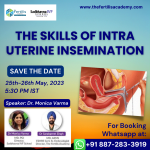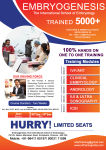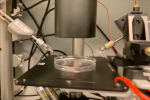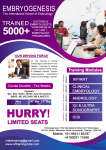
IVF NewsCourse: ART & Embryology training program
Chennai Fertility Center and Research Institute 11 May 2023

The International School of Embryology was established to offer training for clinicians in advanced reproductive technologies. Our skill and precision to all aspirants help them to know in-depth knowledge and experience. The members of our teaching faculty aim to bring doctors and embryologists to the highest level of knowledge about reproductive techniques and practical capability in the field. Our courses cover basics in Andrology, Embryology, ICSI, and cryosciences (Hands-on). Limited Seats. For admission Contact 9003111598 / 8428278218 (Whats app) [ Full Article ] Announcement: Clinical Embryology & In Vitro Fertilisation (distance learning) MSc
The University of Dundee 10 May 2023

The University of Dundee have introduced a new range of part-time distance learning courses in Clinical Embryology and IVF, with the aim of making it easier for people who already work in associated fields to study for a postgraduate qualification, without having to give up on their current employment. There is an increasing worldwide demand for Assisted Reproductive Technology, including IVF, and so there are growing opportunities for enhancing your career in this field. Expanding on their considerable experience in delivering full-time on-campus teaching in this subject area, they have designed three part-time courses to give you the maximum flexibility. You can choose to start off with a postgraduate certificate (60 credits over 12 months), or a postgraduate diploma (120 credits over 24 months) or go for the full MSc (180 credits over 36 months). You can also start off with the certificate course, and if that works out well for you, you can continue on to complete the diploma or full MSc. You will be provided with the wide-ranging education required to become a leader in the field of ART, including training in basic science, embryology, andrology, clinical and controversial issues, and business management. You will also explore research in reproductive medicine, designing and undertaking your own project. There will be a joint clinical and laboratory focus, due to a dynamic collaboration with a busy clinical ART centre at Ninewells Hospital (one of Europe’s largest University Hospitals). You will have the opportunity to observe various activities within the ART centre, including embryology procedures and following patient journey from initial scans through the entire ART process. The people teaching on the course have a range of expertise, including scientists, clinicians, embryologists, andrologists, counsellors and business managers. A series of distinguished speakers will also give you access to seminars by world leaders in the field of embryology and ART. You will also develop a unique network of practitioners across the globe, supporting you in your future career. Visit their website to find out more: uod.ac.uk/ceivf-dl [ Full Article ] News: First UK Baby with Three-Person DNA Born to Prevent Mitochondrial Diseases
IVF.net Newsdesk 10 May 2023
The United Kingdom has welcomed its first baby conceived with DNA from three individuals, thanks to a revolutionary IVF technique called mitochondrial donation treatment (MDT). This groundbreaking method aims to prevent children from inheriting incurable diseases caused by mutated mitochondrial DNA. MDT combines sperm and egg from the biological parents with healthy mitochondria from a female donor's egg. As a result, the baby receives DNA from both parents, as well as a small percentage of genetic material from the donor. The phrase "three-parent babies" has emerged due to the technique, even though more than 99.8% of the DNA comes from the mother and father. The Newcastle Fertility Centre pioneered MDT research, intending to help women with mutated mitochondria have healthy children without passing on genetic disorders. In 2015, the UK Parliament approved MDT, and by 2018, the Newcastle clinic was licensed to perform the procedure. The UK's Human Fertilisation and Embryology Authority (HFEA) has since granted permission for at least 30 cases on a case-by-case basis. The HFEA confirmed that a few babies have been born in the UK following MDT, without providing further details or an exact number. The treatment program experienced delays due to the pandemic, which discouraged some donors and affected couples seeking therapy. These details have come to light following a Freedom of Information request submitted by The Guardian newspaper. While MDT is a significant breakthrough, it is not without risks. In some cases, abnormal mitochondria from the mother's egg can multiply in the donor egg, potentially leading to disease in the child. However, clinical experience with MDT has been promising, but long-term follow-up is crucial to determine its safety and efficacy. [ Full Article ] News: The Skills of Intrauterine Insemination
Dr. Sarabpreet Singh 05 May 2023

The Fertilis Academy in association with Sadbhavna IVF School is offering "The Skills of Intrauterine Insemination" for Gynecologists Embryologists, Andrologists, and IVF Professionals planning to enhance their skills. [ Full Article ] News: ART & Embryology training program
Chennai Fertility Center and Research Institute 02 May 2023

June 2023 Training Batch Schedule - 05th June - 19th June 2023. The International School of Embryology was established to offer training for clinicians in advanced reproductive technologies. Our skill and precision to all aspirants help them to know in-depth knowledge and experience. The members of our teaching faculty aim to bring doctors and embryologists to the highest level of knowledge about reproductive techniques and practical capability in the field. Our courses cover basics in Andrology, embryology, ICSI, and cryosciences (Hands-on). Limited Seats. For admission Contact 9003111598 / 8428278218 (Whats app) [ Full Article ] News: Discovery of ARRDC5: A Potential Breakthrough in Male Contraceptive Development
IVF.net Newsdesk 01 May 2023
Researchers at Washington State University have discovered a gene specific to male testes that could lead to the development of a highly effective, reversible, and non-hormonal male contraceptive for both humans and animals. The gene, known as Arrdc5, is expressed in the testicular tissue of mice, pigs, cattle, and humans. When the gene was knocked out in mice, male infertility resulted, impacting sperm count, movement, and shape. The study, published in the journal Nature Communications, identified the Arrdc5 gene as being expressed only in testicular tissue, and in multiple mammalian species. When the gene was inactivated or inhibited in males, the sperm produced could not fertilize an egg, making it an ideal target for male contraceptive development. Importantly, lack of the gene also causes significant infertility, creating a condition called oligoasthenoteratospermia or OAT, which is the most common diagnosis for human male infertility. In the study, male mice lacking the gene produced 28% less sperm that moved 2.8 times slower than in normal mice, and about 98% of their sperm had abnormal heads and mid-pieces. Disrupting the protein encoded by the Arrdc5 gene would not require hormonal interference, which is a significant hurdle in male contraception. The protein could be targeted by a drug, making the contraceptive easily reversible. As the gene is found across mammalian species, the discovery also holds promise for use in animals, potentially replacing castration as a way to control reproduction in livestock or to limit overpopulation of wildlife species. The initial focus, however, is on giving humans more control over their own reproduction. With more than half of pregnancies worldwide still unintended, according to the United Nations, the development of an effective male contraceptive could have far-reaching impacts. The research team will work on designing a drug that would inhibit the production or function of the protein encoded by the Arrdc5 gene. They have filed a provisional patent for the development of a male contraceptive based on this gene and the protein it encodes. The study received support from the National Institutes of Health and WSU's Functional Genomics Initiative. Sources and References
[ Full Article ] News: Unmarried Women and IVF: China's Solution to Demographic Decline?
IVF.net Newsdesk 30 April 2023
China's demographic decline is an increasing concern for the nation, and unmarried women seeking IVF treatment might be part of the solution. Recently, Chengdu, the capital of the southwestern Sichuan province, legalized the registration of children by unmarried women, granting them access to paid maternity leave, child subsidies, and the possibility of legal IVF treatment in private clinics. Chen Luojin, a 33-year-old divorced woman from Chengdu, is now 10 weeks pregnant through IVF, a testament to the policy's potential success. The Chinese government has been considering implementing these changes nationwide to address the record low birth rates. Liberalizing IVF across the country could significantly increase demand for fertility treatment, straining the already limited fertility services. However, investors in the industry see a growth opportunity. China's National Health Commission (NHC) has not commented publicly on the recommendations, but they have acknowledged that many young women are delaying plans to marry and have children due to high costs of education and child-rearing. In February, the Sichuan branch of the NHC announced changes aimed at promoting "long-term and balanced population development." Despite challenges such as gender power imbalances, societal stigma, and uncertainty over IVF incentives, increasing access to fertility services might have a significant impact on China's demographic issues. Around 300,000 babies are currently born in China via IVF annually, making up about 3% of all newborns. As more Chinese women postpone or give up on having babies, many still desire to become mothers. For them, IVF treatments could be the solution, offering a new avenue to motherhood regardless of marital status. Sources and References Reuters: [ Full Article ] News: First babies born using ICSI robot
IVF.net Newsdesk 28 April 2023

Last spring, engineers from Barcelona shipped their sperm-injecting robot to New York City's New Hope Fertility Center, where they reassembled the instrument, including a microscope, mechanized needle, petri dish, and laptop. An engineer with no experience in fertility medicine then used a PlayStation 5 controller to position the robotic needle, which autonomously penetrated a human egg and delivered a single sperm cell. Over a dozen eggs were fertilized using the robot, resulting in healthy embryos and eventually two baby girls. The robot, developed by startup Overture Life, represents an initial step towards automating in vitro fertilization (IVF) and potentially making the procedure more affordable and widespread. Currently, trained embryologists earning over $125,000 per year delicately handle sperm and eggs using ultra-thin hollow needles under a microscope in IVF labs. Overture envisions an automated process, with their patent application describing a "biochip" containing hidden reservoirs of growth fluids and small channels for sperm. Santiago Munné, chief innovation officer at Overture Life, believes that if IVF could be performed in a desktop instrument, patients might not need to visit specialized clinics, where a single attempt at pregnancy can cost $20,000 in the US. Instead, a patient's eggs could be directly input into an automated fertility system at a gynecologist's office, significantly reducing costs. With approximately 500,000 children born through IVF globally each year, automating the process could increase access to fertility medicine for those who cannot afford or access it. However, fully automating IVF is challenging, as test-tube conception involves numerous procedures, and Overture's robot currently performs only one of them and only partially. Some doctors are skeptical that robots can or should replace embryologists soon, while others see automation playing a more limited role, such as dispensing consistent droplets of growth medium for embryos. Despite the hurdles, automating parts of the IVF process could make it less expensive and pave the way for more radical innovations like gene editing or artificial wombs. Sources and References [ Full Article ] News: ART & Embryology training program
Chennai Fertility Center and Research Institute 26 April 2023

May 2023 Training Batch Schedule - 08th May- 22nd May 2023. The International School of Embryology was established to offer training for clinicians in advanced reproductive technologies. Our skill and precision to all aspirants help them to know in-depth knowledge and experience. The members of our teaching faculty aim to bring doctors and embryologists to the highest level of knowledge about reproductive techniques and practical capability in the field. Our courses cover basics in Andrology, embryology, ICSI, and cryosciences (Hands-on). Limited Seats. For admission Contact 9003111598 / 8428278218 (Whats app) [ Full Article ] News: BRILLIANT MINDS: NEW APPROACHES IN ART AND FERTILITY TREATMENT
International IVF Initiative 24 April 2023

Tuesday, 9th May (3 pm EST / 8 pm UK / 9 pm CET) |